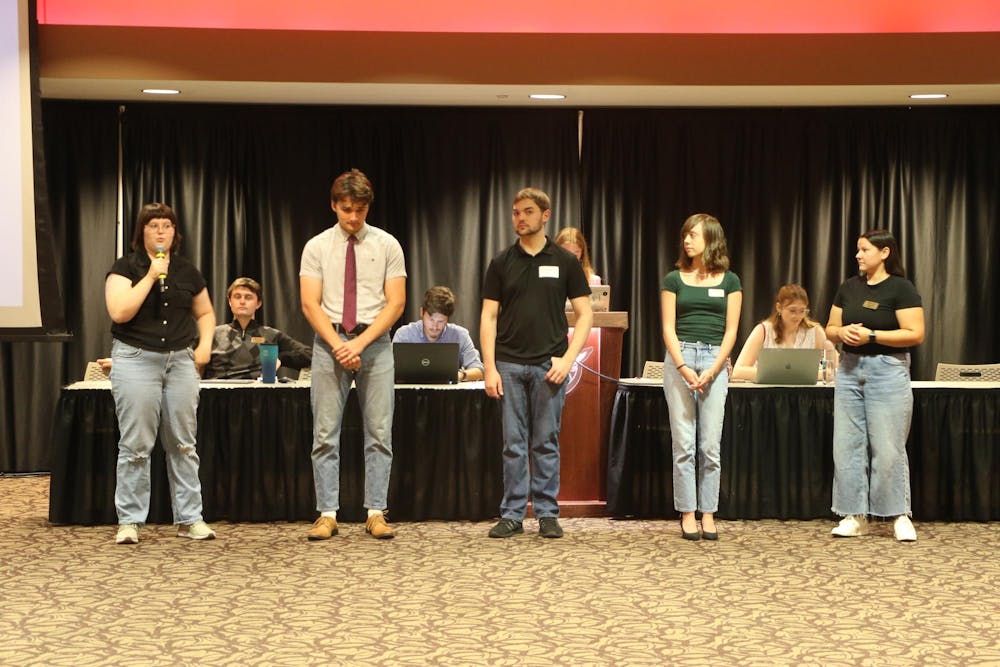Content Warning: This article contains mentions of sexual assault.
Editors note: This article has been updated to clarify the acronym F.R.I.E.S and correct information surrounding the Indiana Lifeline and Madison Jones title.
Ball State University’s Student Government Association (SGA) began their Sept. 18 meeting with a special presentation from Madison Jones, a graduate assistant for the Center for Survivor Support at the university.
Jones explained what consent is and offered “Red Zone” resources for students who may need them. According to Ball State the Red Zone is, “A 6-week time frame in the beginning of the Fall semester which is marked by an especially high incidence of sexual assaults on college campuses across the country”
RELATED: "4 Ways to Keep Yourself and Others Safe in ‘The Red Zone’"
“We act as a guide and a resource for these students, and that comes in a couple different forms,” Jones said. “We can attend court with them if they decide they want to go through the criminal court process. Many students may choose to fill out a protective order…we can also sit through and fill that out with them as well as going to the hospital with them.”
Some policies Ball State offers are The Good Neighbor Exception and the Indiana Lifeline.
“Say you're intoxicated and you're under the age of 21 and you are calling the police or whoever, for someone that you believe [has] alcohol poisoning, you and that person you are calling about are protected within reason,” Jones said
Ball State's Good Neighbor Exception provides University officials the opportunity to waive University conduct action regarding alcohol or drug policy violations, whereas the Indiana Lifeline Law only provides immunity for some alcohol-related violations.
Madison used the acronym F.R.I.E.S, to understand levels of consent:
F- Consent is freely given and not forced out.
R- Consent is reversible, such as agreeing to something and later taking it back.
I- Consent is informed, meaning that all parties are informed of what's happening.
E- Enthusiastic consent, is where you're looking for that verbal “yes”.
S- Specific refers to consent to one thing, but not consent to everything.

Jones emphasized if students ever need to reach out to Health Promotion and Advocacy, they can call 765-285-3775 or via email hpa@bsu.edu. She said they are always on call, and if they don’t answer students can call 765-285-1111 for the University Police Department (UPD).
Students can also receive free sexual assault exams at IU Ball Memorial Hospital via the purple loop bus on campus. Jones said the exams are open to all genders and won’t go on students' records.
During executive orders, President Noah Poole updated the Senate about his plan for transportation to Scheumann Stadium.
“Our executive team had a meeting with the athletics department…to provide on campus stops for students during home football games,” Poole said.
He also introduced a new initiative SGA is spearheading called “Stall Talk”, which is “to provide students with new campus activities and opportunities in a unique way.”
Poole said this informational newsletter program is in the works to be started at the L.A. Pittenger Student Center in the student restroom facilities.
Parliamentarian Brian Truell reminded senators that they need at least one person from each caucus to join the Rules and Constitution Committee.

Chief of Staff Chelsea Murdock said, students from the sustainability group got together and met with Chief Sustainability Officer Margaret Love to talk about how to maximize the green spaces on campus.
At the end of the meeting, Large announced upcoming events for the Senate, such as the Civic Learning Symposium on Sept. 27 and 28 at the L.A. Pittenger Student Center. Ball State University students can register for the event for free.
With no new or unfinished business, the meeting was adjourned.
Contact Shelby Anderson via email at sanderson9@bsu.edu





The Daily News welcomes thoughtful discussion on all of our stories, but please keep comments civil and on-topic. Read our full guidelines here.